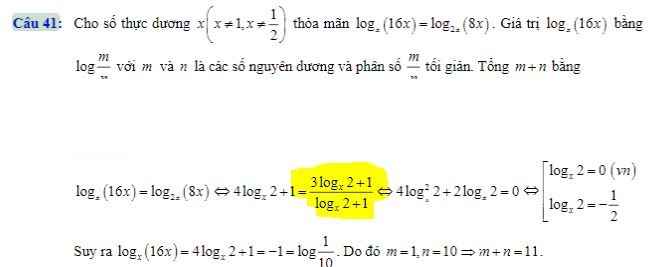giải pt sau
\(\log_x=\frac{1}{2}\log_{\left(x+1\right)}\)
Cho số thực dương \(x,\left(x\ne1,x\ne\dfrac{1}{2}\right)\) thỏa mãn \(log_x\left(16x\right)=log_{2x}\left(8x\right)\). Giá trị \(log_x\left(16x\right)\) bằng \(log\dfrac{m}{n}\) với \(m\) và \(n\) là các số nguyên dương và phân số \(\dfrac{m}{n}\) tối giản. Tổng \(m+n\) bằng?
Giải thích cho mình dòng bôi vàng ở dưới, mình cảm ơn nhiều ♥

giải bpt logarit đưa về cùng cơ số
1, \(2lg\left[\left(x-1\right)\sqrt{5}\right]>lg\left(x-5\right)+1\)
2, \(log_{\dfrac{1}{2}}\left[log_2\left(3^x+1\right)\right]>-1\)
3, \(log_x\dfrac{3x-1}{x^2+1}>0\)
4, \(\left(0,08\right)^{log_{0,5-x}x}\ge\left(\dfrac{5\sqrt[]{2}}{2}\right)^{log_{x-0,5}\left(2x-1\right)}\)
- Ai đó làm giúp với nhé
bpt logarit đưa về cùng cơ số :
1, \(2lg\left[\left(x-1\right)\sqrt{5}\right]>lg\left(x-5\right)+1\)
2, \(log_{\dfrac{1}{2}}\left[log_2\left(3^x+1\right)\right]>-1\)
3, \(log_x\dfrac{3x-1}{x^2+1}>0\)
4, \(\left(0,08\right)^{log_{x-0,5}x}\ge\left(\dfrac{5\sqrt{2}}{2}\right)^{log_{x-0,5}\left(2x-1\right)}\)
Tập nghiệm của bất pt \(\log_{\dfrac{1}{2}}\left(x+1\right)-log_{\dfrac{1}{2}}\left(2x-1\right)< 2\)
ĐKXĐ: \(x>\dfrac{1}{2}\)
\(log_{\dfrac{1}{2}}\left(\dfrac{x+1}{2x-1}\right)< 2\)
\(\Rightarrow\dfrac{x+1}{2x-1}>\dfrac{1}{4}\)
\(\Rightarrow x>-\dfrac{5}{2}\)
Kết hợp ĐKXĐ: \(\Rightarrow x>\dfrac{1}{2}\)
Giải bất phương trình :
\(\log_{\frac{1}{2}}\left(4^x+4\right)\ge\log_{\frac{1}{2}}\left(2^{x+1}-3\right)-\log_22^x\)
\(\log_{\frac{1}{2}}\left(4^x+4\right)\ge\log_{\frac{1}{2}}\left(2^{x+1}-3\right)-\log_22^x\)
\(\Leftrightarrow\log_{\frac{1}{2}}\left(4^x+4\right)\ge\log_{\frac{1}{2}}\left(2^{x+1}-3\right)+\log_{\frac{1}{2}}2^x\)
\(\Leftrightarrow\log_{\frac{1}{2}}\left(4^x+4\right)\ge\log_{\frac{1}{2}}\left(2^{2x+1}-3^x\right)\)
\(\Leftrightarrow4^x+4\le2^{2x+1}-3.2^x\)
\(\Leftrightarrow4^x-3.2^x-4\ge0\)
\(\Leftrightarrow\begin{cases}2^x\le-1\left(L\right)\\2^x\ge4\end{cases}\)\(\Leftrightarrow x\ge2\)
Vậy bất phương trình có tập nghiệm \(S=\left(2;+\infty\right)\)
tìm x
\(\frac{3}{2}\log_{\frac{1}{2}}\left(x+2\right)^2-3=\log_{\frac{1}{4}}\left(4-x\right)^3+\log_{\frac{1}{4}}\left(6+x\right)^3\)
đk: \(\begin{cases}x+2\ne0\\4-x>0\\6+x>0\end{cases}\)
ta có \(3\log_{\frac{1}{4}}\left(x+2\right)-3=3\log_{\frac{1}{4}}\left(4-x\right)+3\log_{\frac{1}{4}}\left(6+x\right)\) suy ra \(\log_{\frac{1}{4}}\left(x+2\right)-\log_{\frac{1}{4}}\frac{1}{4}=\log_{\frac{1}{4}}\left(4-x\right)\left(6+x\right)\) suy ra \(\log_{\frac{1}{4}}\left(x+2\right).\frac{1}{4}=\log_{\frac{1}{4}}\left(4-x\right)\left(6+x\right)\) suy ra \(\frac{x+2}{4}=\left(4-x\right)\left(6+x\right)\)
giải pt tìm ra x
đối chiếu với đk của bài ta suy ra đc nghiệm của pt
Giải bất phương trình:
\(a,\log_{0,1},1\left(x^2+x-2\right)>\log_{0,1}\left(x+3\right)\)
\(b,\log_{\dfrac{1}{3}}\left(x^2-6x+5\right)+2\log_3\left(2-x\right)\ge0\)
a. Vì \(0< 0,1< 1\) nên bất phương trình đã cho
\(\Leftrightarrow0< x^2+x-2< x+3\)
\(\Leftrightarrow\left\{{}\begin{matrix}x^2+x-2>0\\x^2-5< 0\end{matrix}\right.\)
\(\Leftrightarrow\left\{{}\begin{matrix}\left[{}\begin{matrix}x< -2\\x>1\end{matrix}\right.\\-\sqrt{5}< x< \sqrt{5}\end{matrix}\right.\)
\(\Leftrightarrow\left\{{}\begin{matrix}-\sqrt{5}< x< -2\\1< x< \sqrt{5}\end{matrix}\right.\)
Vậy tập nghiệm của bất phương trình là \(S=\left\{-\sqrt{5};-2\right\}\) và \(\left\{1;\sqrt{5}\right\}\)
b. Điều kiện \(\left\{{}\begin{matrix}2-x>0\\x^2-6x+5>0\end{matrix}\right.\)
Ta có:
\(log_{\dfrac{1}{3}}\left(x^2-6x+5\right)+2log^3\left(2-x\right)\ge0\)
\(\Leftrightarrow log_{\dfrac{1}{3}}\left(x^2-6x+5\right)\ge log_{\dfrac{1}{3}}\left(2-x\right)^2\)
\(\Leftrightarrow x^2-6x+5\le\left(2-x\right)^2\)
\(\Leftrightarrow2x-1\ge0\)
Bất phương trình tương đương với:
\(\left\{{}\begin{matrix}x^2-6x+5>0\\2-x>0\\2x-1\ge0\end{matrix}\right.\) \(\Leftrightarrow\left\{{}\begin{matrix}\left[{}\begin{matrix}x< 1\\x>5\end{matrix}\right.\\x< 2\\x\ge\dfrac{1}{2}\end{matrix}\right.\)
\(\Leftrightarrow\dfrac{1}{2}\le x< 1\)
Vậy tập nghiệm của bất phương trình là: \(\left(\dfrac{1}{2};1\right)\)
Rút gọn biểu thức sau :
\(R=\log_22x^2+\left(\log_2x\right).x^{\log_x\left(\log_2x+1\right)}+\frac{1}{2}\log^2_4x^4\)
\(R=\log_22x^2+\left(\log_2x\right)x^{\log_x\left(\log_2x+1\right)}+\frac{1}{2}\log^2_4x^4\)
\(=1+2\log_2x+\left(\log_2x\right)\left(\log_2x+1\right)+2\log^2_2x\)
\(=3\log^2_2x+3\log_2x+1\)
m.n giải giúp mình vs ạ
a) \(6^x-2^x=32\)
b) \(5^{7^x}=7^{5^x}\)
c) \(\log_x\left(x+1\right)=\log_{1,5}\)
d) \(3^x+3^{-x}=\sqrt[2]{8-x^2}\)
e)\(x^{\log_2\left(9\right)}=x^2\cdot3^{\log_2x}-x^{\log_23}_{ }\)
Lời giải:
a) Vì \(6^x-2^x>0\Rightarrow x>0\)
Xét \(y=6^x-2^x-32\) có \(y'=\ln 6.6^x-\ln 2.2^x>0\forall x>0\) nên hàm $y$ đồng biến trên \(x\in(0,+\infty)\).
Khi đó phương trình \(6^x-2^x=32\) có nghiệm duy nhất $x=2$
b) Có \(5^{7^x}=7^{5^x}\Leftrightarrow \log(5^{7^x})=\log (7^{5^x})\)
\(\Leftrightarrow 7^x\log 5=5^x\log 7=7^{x\frac{\log 5}{\log 7}}\log 7\)
\(\Leftrightarrow 7^{x(1-\frac{\log 5}{\log 7})}=\frac{\log 7}{\log 5}=10^{x\log 7(1-\frac{\log 5}{\log 7})}=10^{x\log(\frac{7}{5})}\)
\(\Leftrightarrow x\log\frac{7}{5}=\log\left ( \frac{\log 7}{\log 5} \right )\)\(\Rightarrow x=\frac{\log\left ( \frac{\log 7}{\log 5} \right )}{\log\frac{7}{5}}\)
d) ĐKXĐ:...........
\(3^x+\frac{1}{3^x}=\sqrt{8-x^2}\Leftrightarrow 9^x+\frac{1}{9^x}+2=8-x^2\)
\(\Leftrightarrow 9^x+\frac{1}{9^x}+x^2=6\)
Giả sử \(x\geq 0\) . Xét hàm \(y=9^x+\frac{1}{9^x}+x^2\) có \(y'=9^x\ln 9-\frac{\ln 9}{9^x}+2x\geq 0\) nên hàm đồng biến trên \(x\in [0,+\infty)\)
Do đó PT \(9^x+\frac{1}{9^x}+x^2=6\) với $x\geq 0$ có nghiệm duy nhất \(x\approx 0,753897\)
---------------------------------------------------------------------------------
Vì hàm \(y\) là hàm chẵn nên $-x$ cũng là nghiệm, do đó tổng kết lại PT có nghiệm là \(x\approx \pm 0,753897\)
e) ĐK: $x>0$
\(\text{PT}\Leftrightarrow x^{\log_29}+x^{\log_23}=x^2.3^{\log_2x}\)
\(\Leftrightarrow x^{2\log_23}+x^{log_23}=x^2.x^{log_23}\Leftrightarrow x^{log_23}(x^{\log_23}+1-x^2)=0\)
\(\Leftrightarrow x^{\log_23}+1-x^2=0\) (do \(x>0\))
Dễ thấy \(x^2>x^{\log_23}\Rightarrow x>1\)
Xét hàm \(y=x^2-x^{\log_23}\Rightarrow y'=2x-\log_23x^{\log_23-1}>0\forall x>1\) nên hàm $y$ là hàm đồng biến
Do đó PT có nghiệm duy nhất $x=2$
c) Có lẽ bạn type thiếu đề